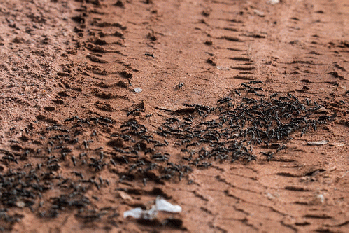| Back OpEd News | |||||||
|
Original Content at https://www.opednews.com/articles/I-m-sweating-by-Gary-Lindorff-Poems_Poetry-220718-754.html (Note: You can view every article as one long page if you sign up as an Advocate Member, or higher). |
|||||||
July 18, 2022
I'm sweating followed by a reflection
By Gary Lindorff
I'm sweating./ How about you? / Sweating because much of Europe / China and India and Australia is heating up.
::::::::
I'm sweating.
How about you?
Sweating because much of Europe
China and India and Australia is heating up.
And virtually nothing is being done about it.
You know how ants behave
When you disturb their nest?
They spontaneously abandon the site,
Bringing their eggs underground.
If I am the cause
I usually back off
And give them 15 minutes or so
To clear out and do whatever they do
To deal with catastrophe,
Which they always
Manage brilliantly.
Sound familiar?
That's like us.
We are excellent at reconnoitering,
Scrambling, clearing out, reorganizing.
Sure, there is massive loss
Of lives and property
But after the blight,
Hurricane, typhoon, fire, war
We're back . . .
Kind of doing what we did before,
Because dealing with
The aftermath of disaster
Is what we do best.
In the "now", there is chaos, suffering,
Anger, grief, despair . . .
But the algorithm guides us through.
We recover, rebuild, forget.
Did I say forget?
What does the government do?
It sends aid, some money, some experts.
It sends relief, equipment.
Anything the ants need.
As long as they
Continue being ants.
Governance is little more
Than a tolerated algorithm
Whose sole purpose
is maintaining the status quo
For as long as possible.
It doesn't understand change.
I mean it honestly
Doesn't understand change.
What I am trying to say is,
It doesn't understand
Climate Change.
Neither do ants.
That is what we are dealing with,
So we need not be surprised
If civilization is allowed to fail.
So I'm sweating.
.............
This poem presumes that ants function by pure instinct and, within a certain paradigm of calamity, it assumes that their response to calamity is a colony-wide response. Even when I was a little kid I marveled at how, when something exposes or devastates their nest (i.e., me), they spring to action and every ant seems to know exactly what to do. It reminds me of how a town comes together after a hurricane or some other disaster, such as war or a wildfire. But what would the ants do if the ground started heating up by increments of few degrees a year, since where they take their eggs when chaos strikes is underground. I am no scientist and am horrified by the scenario I just imagined. But I would speculate that they wouldn't know what to do in such a situation, such as removing their eggs above ground to. say, a rotten log, which would call for thinking outside the instinctive algorithm that limits the creativity of their response to catastrophe. The point this poem is making is, both the government and the average person are in lockstep in being completely unimaginative and are behaving exactly like the ant when it comes to Climate Change, that is to say, non-responsive, even as the world heats up year by year, albeit so slowly, it is hard to measure in any convincing way. So, basically, this poem predicts that, unless the algorithms that govern our behaviors change, Climate Change will be the straw that breaks the back of modern civilization.
(Article changed on Jul 21, 2022 at 7:25 PM EDT)
Authors Website: https://garylindorff.wordpress.com
Authors Bio:
Gary Lindorff is a poet, writer, blogger and author of five nonfiction books, three collections of poetry, "Children to the Mountain", "The Last recurrent Dream" (Two Plum Press), "Conversations with Poetry (coauthored with Tom Cowan), and a memoir, "Finding Myself in Time: Facing the Music". Lindorff calls himself an activist poet, channeling his activism through poetic voice. He also writes with other voices in other poetic styles: ecstatic, experimental and performance and a new genre, sand-blasted poems where he randomly picks sentence fragments from books drawn from his library, lists them, divides them into stanzas and looks for patterns. Sand-blasted poems are meant to be performed aloud with musical accompaniment.
He is a practicing dream worker(with a strong, Jungian background) and a shamanic practitioner. His shamanic work is continually deepening his partnership with the land. This work can assume many forms, solo and communal, among them: prayer, vision questing, ritual sweating, and sharing stories by the fire. He is a born-pacifist and attempts to walk the path of non-violence believing that no war is necessary or inevitable.
